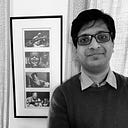Five songs for the week — 2
Doreswamy Iyengar, Chembai Vaidyanatha Bhagvathar, Aishwarya Vidhya Raghunath + Priya Purushothaman, Malladi Brothers, Kumar Gandharva
One: Doreswamy Iyengar — Sri Ramam (Raga Narayanagowla, Muthuswami Dikshitar)
I have mentioned the ‘Home Called of Parvathi’ before. This venue in Mysore seems to have actively hosted many musicians over several decades. From what I gather, it wasn’t so much a proper ‘sabha’ as simply the venue at which a generous and seemingly wealthy patron shared his love of music by organising concerts for the public. Their website is a rich trove of music and anecdotes. I am glad to note they have recently started uploading many of their concert recordings on to YouTube. This piece is from a concert by Doreswamy Iyengar in 1997, perhaps one of the last recordings of his music that we have. Sri Ramam is perhaps the best-known song in this rarely heard and disappearing raga (apparently losing its identity and popularity over time to two ragas with similar scales — Kedaragowla and Surutti). Doreswamy Iyengar also plays a little tanam before the piece and a short tani-avartanam by the percussionists follows.
Two: Chembai Vaidhyanatha Bhagvathar — Ragam Tanam Pallavi (Raga Thodi)
Most of the recordings we have of Chembai Vaidhyanatha Bhagvathar are from his later years. In these recordings, his voice is strong, but not particularly fluid. You can almost ‘see’, let alone hear, the changes in notes, and his sangathis are not particularly intricate. The musicality is intact, though, and they still make for great listening. I was therefore blown away by the sheer speed and smoothness of voice in this recording of this very short Ragam-Tanam-Pallavi in the raga Thodi, from 1937 (when he would have been just over forty years old). The last bit of the swara passage is so fast, that I actually couldn’t figure out if was singing individual swaras or not! And I still cannot make up my mind. The accompanists, including Chowdiah on violin and Pazhani Subramania Pillai on kanjira are superb.
[I first came across this piece on the Pokri Poki Youtube channel which has lots of music transferred from old LP records, Carnatic and Hindustani. Unfortunately, though, only the Pallavi was uploaded. The channel Vaak has recently uploaded the entire 40-minute concert, from which this piece is excerpted. The ultra short durations of both the ragam-tanam-pallavi and the concert itself indicates that the intent was for it to be recorded on LP records.]
Three: Aishwarya Vidhya Raghunath + Priya Purushothaman — Rangapura Vihara, Muthuswami Dikshitar + Baurey Jin Alla, Firoz Khan (Ragas Brindavana Saranga + Brindavani Sarang)
I am a great fan of First Edition Arts — their curation, videography, production values, their support of artistes, especially upcoming ones, and their penchant for experimentation while always being true to the art forms they promote. This is a wonderful piece from an event earlier this year at the Bangalore International Centre. The music is beautifully delivered and the artistes have brought out the best of the Carnatic / Hindustani ‘jugalbandi’ form — keeping both forms clear and distinct while also also achieving musical cohesion.
Four: Malladi Brothers — Janakaja Sametha (Raga Asaveri, Thyagaraja)
One of the many reasons I like listening to concerts of the Malladi Brothers, is their raga selection. Another is that I am liable to discover songs I have not come across before, even those of well known composers like Thyagaraja. In these twin ways, chancing upon this song was perfect. It was new to me and it is in one of my favourite ragas — Asaveri. And delivered in fine form.
Five: Kumar Gandharva — Ud Jaayega Hans Akela (Kabir)
I first came across Kumar Gandharva’s music in boarding school. Our house parent (Jayant Tengshe) was a big fan, and would frequently play a song by him, starting with ‘Guruji…’ to wake us up. One of my favourite albums to listen to while working, especially early in the morning, or when I need a dose of energising calm is a recording of a concert of his at the NCPA. I recently discovered this delightful Kabir bhajan — Ud Jaayega Hans Akela while driving and asking Spotify to play Kumar Gandharva. It is similar in meaning and tenor to another Kabir song that we used to sing at assembly in boarding school — Maati Kahe Kumhar Ko. Kumar Gandharva’s versions of several Kabir songs are iconic. This is not surprising — his inclusive and serious creativity, intellectual integrity and playful lightness of touch are perfectly matched to the thoughts of Kabir.
